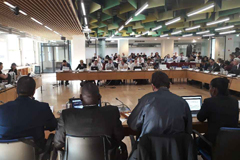 |
The press release of the 14th meeting of the POPs Review Committee is available online.
Stockholm Convention’s scientific committee recommends listing PFOA in Annex A
 As the UN reports that 2.78 million workers worldwide die each year from exposure to toxic substances in unsafe workplaces[1], a UN global scientific committee recommends eliminating two more toxic chemicals, to protect human health and the environment.
The UN Stockholm Convention’s Persistent Organic Pollutants Review Committee (POPRC) held its 14th meeting at the Food and Agriculture Organization (FAO) Headquarters in Rome, from 17 - 21 September 2018. More than 150 chemicals experts, from all UN regions, attended the meeting.
The Committee recommended to eliminate the industrial chemical perfluorooctanoic acid (PFOA), its salts and PFOA-related compounds, widely used in domestic non-stick cooking ware and food-processing appliances, surface treatment agents in textiles, paper and paints, and in firefighting foams. The chemical is known to be toxic to humans and the environment with links to major health issues such as kidney cancer, testicular cancer, thyroid disease, and pregnancy-induced hypertension[2].
This recent recommendation, together with the additional recommendation made by the Committee at its previous meeting, held in October 2017, to eliminate the pesticide dicofol[3], will be considered by the next meeting of the Conference of the Parties (COP), which will be held in Geneva from 29 April to 10 May 2019.
The theme of the next COP is: Clean Planet, Healthy People: Sound Management of Chemicals and Waste. To date, 28 chemicals of global concern have been listed under the Stockholm Convention.
Dicofol is a pesticide similar to DDT, used to control mites on field crops, tea, cotton, fruits and vegetables and ornamentals, highly toxic to fish, birds, aquatic organisms and algae and posing a health risk to humans.
Rolph Payet, Executive Secretary of the Basel, Rotterdam and Stockholm conventions, stressed that “The Committee has found that both Dicofol and PFOA satisfy all criteria for listing, has considered additional information, and has made its recommendation, and so the decision to list will be discussed by Parties to the Convention at their next available opportunity, the next COP in April next year. At a time when the sound management of chemicals is high on the public agenda, once again the work of this Committee is shown to be exemplary in its approach and robustness, making recommendations aimed at protecting human health and environment: truly, working for a clean planet and healthy people.”
The Executive Secretary expressed his thanks to the members of the Committee for their hard work, evident from research showing a reduction in some POPs worldwide, according to data collected by the Convention’s Global Monitoring Plan.
Note for Editors:
The Stockholm Convention on Persistent Organic Pollutants is a global treaty to protect human health and the environment from chemicals that remain intact in the environment for long periods, become widely distributed geographically, accumulate in the fatty tissue of humans and wildlife, and have harmful impacts on human health or on the environment. Exposure to Persistent Organic Pollutants (POPs) can lead to serious health effects including certain cancers, birth defects, dysfunctional immune and reproductive systems, greater susceptibility to disease and damage to the central and peripheral nervous systems. Given their long-range transport, global action is needed to protect citizens and the environment from POPs.
In response to this global problem, the Stockholm Convention, which was adopted in 2001 and entered into force in 2004, requires its Parties to take measures to eliminate or reduce the release of POPs into the environment. As of today, this legally-binding Convention has 182 Parties, giving it almost universal coverage.
For more information, please contact:
- For POPRC/Stockholm Convention: www.pops.int or contact:
Kei OHNO WOODALL, Secretariat of the Basel, Rotterdam and Stockholm Conventions (UNEP), Geneva: +41-79-2333218, +41-22-917-78201, kei.ohno-woodall@brsmeas.org
- For BRS conventions general media enquiries: www.brsmeas.org or contact:
Charlie AVIS, Public Information Officer (UN Environment), Geneva +41-79-7304495
[1] From “The Report Special Rapporteur on the implications for human rights of the environmentally sound management and disposal of hazardous substances and wastes” A/HRC/39/48, presented 12 September 2018 to the 39th session of the Human Rights Council, Geneva. Available online at: XXX
|
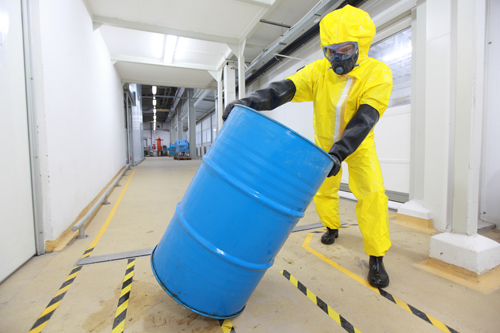 |
The Press Release of the 14th Meeting of the Chemical Review Committee, which closed on 13 September in Rome, is available online.
4 hazardous chemicals recommended to be listed in Rotterdam Convention annex
 With the goal to protect human health and environment by assisting governments to make informed decisions concerning trade in pesticide and industrial chemicals, the UN Rotterdam Convention’s Chemicals Review Committee held its 14th meeting at the Food and Agriculture Organization (FAO) Headquarters in Rome, from 11 - 13 September 2018 with chemicals experts from all the UN regions attending the meeting.
The four hazardous chemicals recommended to be listed are:
- The pesticide acetochlor, used for example as a herbicide on maize, known to be highly toxic to aquatic organisms and posing a high risk to birds and non-targeted plants[1];
- The industrial chemical hexabromocyclododecane, used for example in flame retardants and polystyrene foam insulation, known to be carcinogenic, neurotoxic and harmful for human development as well as toxic to both aquatic and terrestrial species[2];
- The pesticide phorate, widely used to control insects on cotton, potatoes, coffee, beans and corn; and which is extremely toxic, causing lethality at low doses, and with studies showing poisonings and deaths amongst agricultural workers exposed to this active ingredient[3];
- The industrial chemical perfluorooctanoic acid (PFOA), its salts and PFOA-related compounds, widely used in domestic non-stick cooking ware and food-processing appliances, surface treatment agents in textiles, paper and paints, firefighting foams and is known to be toxic to humans and the environment with links to major health issues such as kidney cancer, testicular cancer, thyroid disease, and pregnancy-induced hypertension[4].
The decision to list these chemicals will be taken at subsequent Meetings of the Conference of the Parties (COPs), the next of which will be held in Geneva from 29 April to 10 May 2019. The meeting coincided with the 20th anniversary of the adoption of the Rotterdam Convention, during which time 50 chemicals and pesticides have been listed and become subject to trade control measures.
Carlos Martin Novella, Deputy Executive Secretary of the Basel, Rotterdam and Stockholm conventions, stressed that “these recommendations will further the conventions’ joint aims of protecting human health and the environment” and that “over the course of its twenty years since adoption, the Rotterdam Convention has undoubtedly improved global governance on the trade in pesticides and industrial chemicals, offering as a framework not only for information exchange but also for capacity building, technical assistance, and a supportive climate for informed decision-making on the import and export of chemicals worldwide.”
Christine Fuell, Coordinator of the Rotterdam Convention at FAO emphasized that “the Chemical Review Committee works in a very transparent and inclusive manner, conducting its reviews independently and on science-based information only. The Committee’s work is facilitated by a Handbook of Working Procedures and Policy Guidance, which has been also updated during this meeting to account for the new experiences of its work.”
Note for Editors:
The Rotterdam Convention on the Prior Informed Consent Procedure (PIC) for Certain Hazardous Chemicals and Pesticides in International Trade, is jointly administered by the United Nations Food and Agriculture Organization (FAO) and UN Environment (UNEP). The 160 Parties to this legally-binding Convention share responsibility and cooperate to safely manage chemicals in international trade. To date 50 chemicals and pesticides are listed in its Annex III.
The Rotterdam Convention does not introduce bans but facilitates the exchange of information among Parties on hazardous chemicals and pesticides, and their potential risks. The information can be used to inform and improve national decision making. In addition, through the PIC Procedure, it provides a legally binding mechanism to support national decisions on the import of selected chemicals and pesticides in order to minimize the risk they pose to human health and the environment.
For more information, please contact:
For CRC/Rotterdam Convention: www.pic.int
- Christine FUELL, Secretariat of the Rotterdam Convention (FAO), Rome: +39-06-5705-3765, christine.fuell@fao.org
- FAO media relations office (For journalists) Rome: (+39) 06 570 53625. E-mail: FAO-Newsroom@fao.org
- Kei OHNO WOODALL, Secretariat of the Basel, Rotterdam and Stockholm Conventions (UNEP), Geneva: +41-79-2333218, +41-22-917-78201, kei.ohno-woodall@brsmeas.org
- For BRS conventions general media enquiries: www.brsmeas.org or contact: Charlie AVIS, Public Information Officer (UN Environment), Geneva +41-79-7304495
|
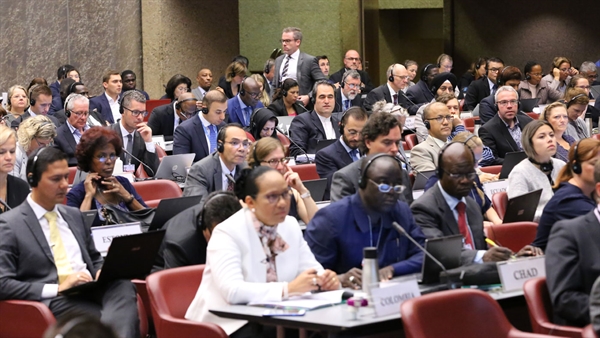 |
The Press Release of the 11th Meeting of the Basel Convention’s Open-ended Working Group is now online.
New era for waste management heralded as waste experts agree a raft of decisions including on marine plastic litter and microplastics
 UN convention on wastes makes breakthrough recommendations to address global marine litter and other types of wastes
6th September 2018: Geneva, Switzerland - Momentum was built in Geneva this week to better address wastes including marine plastic litter and microplastics, through decisions adopted today by the Open-ended Working Group of the Basel Convention on the Control of Transboundary Movements of Hazardous Wastes and their Disposal[1].
More than 400 experts from 135 countries and international organisations, including industry associations, met and today adopted a suit of decisions related to wastes, including marine plastic litter and microplastics, electronic waste, and household waste.
Additionally, a High Level Event was organised bringing together more than 70 ambassadors and heads of international organisations to further enhance the commitment for global action for marine plastic litter.
Decision, which will now be submitted to the next meeting of the Conference of the Parties to the Basel Convention (or COP), to be held at the end of April 2019 in Geneva, include the following:
A proposed new Partnership on Plastic Waste under the Basel Convention, designed as an international vehicle for public-private cooperation, sharing of best practices, and technical assistance in the area of at-source measures to minimise and more effectively manage plastic waste, thus helping tackle the global environmental problem of marine plastic litter;
Consideration of possible amendments to Annexes of the Convention, in relation to solid plastic waste, in order to assist Parties to better minimise and control their transboundary movement;
Further development of the Technical Guidelines on Electronic Waste (or E-waste), which are available for use by Parties to assist in implementing environmentally sound management of E-waste, which is amongst the fastest-growing waste-streams in the world, as well as consideration of options a new partnership on e-waste to follow the Partnership for Action on Computing Equipment (PACE);
Further development of the Household Waste Partnership under the Basel Convention, aiming for an integrated approach for household waste management, acknowledged as one of the key challenges related to waste management faced by national governments, particularly in developing countries;
Enhanced cooperation with World Customs Organisation to strengthen the Harmonized Commodity Description and Coding System, used by customs authorities to improve the control of wastes crossing borders.
Finalisation of the draft Manuals on Extended Producer Responsibility, which when completed can assist Parties with concrete actions for promoting the life-cycle approach in the manufacturing of products through to recycling.
Speaking today shortly before closing, the meeting’s Co-Chairs Mr. Mohamed Kashashneh (Jordan) and Ms. Justina Grigaraviciene (Lithuania) congratulated the Parties on reaching what they deemed to be “an historical outcome regarding marine plastic litter and microplastics. This and other decisions taken this week will bring the Basel Convention to a new era of effectiveness in helping Parties minimize and sustainably manage their wastes.”
Reflecting upon both the OEWG11 and the High Level Event, Rolph Payet, Executive Secretary of the Basel, Rotterdam and Stockholm conventions, said that the decisions of the OEWG11, combined with heightened international commitment “constitute an important step in addressing the technical, legal, and political dimensions of the problem of marine plastic litter and pollution from other hazardous wastes. These three dimensions reinforce one another and are all vital for tackling such a ubiquitous and significant set of issues and challenges.”.
Meetings continue with the organisation of the 13th Meeting of the Basel Convention’s Implementation and Compliance Committee (ICC13) back-to-back with OEWG11, at which progress is expected on a range of relevant legal questions. Details of decisions taken at ICC13 will be posted on the BRS website in due course.
For further information:
Susan Wingfield
Programme Officer, for OEWG-11
Susan.Wingfield@brsmeas.org
Tel: +41-22-9178406
Juliette Voinov Kohler
Legal officer, for ICC-13
Juliette.Kohler@brsmeas.org
Tel: +41-22-9178219
BRS Press Enquiries
Charlie Avis
Public Information Officer
Charles.Avis@brsmeas.org
Tel: +41-79-7304495
[1] The Basel Convention on the Control of Transboundary Movements of Hazardous Waste and their Disposal is the most comprehensive international environmental agreement on hazardous and other wastes and is almost universal, with 186 Parties. For more information, see www.basel.int
|
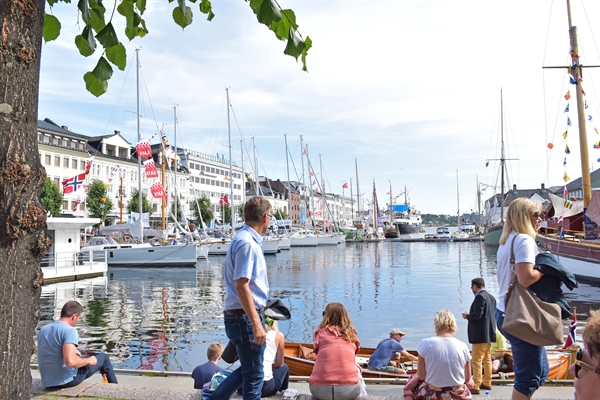 |
Erik Solheim, Head of UN Environment, and Rolph Payet, BRS Executive Secretary, shared a platform in Arendal, Norway on 15 August 2018 to raise awareness on toxic chemicals and their impacts on human health.
Norwegian event on POPs and Body Burden re-affirms need to take action on chemicals and waste
 The Executive Secretary of the Stockholm Convention on Persistent Organic Pollutants, Rolph Payet, today re-affirmed the need for concerted global and national action towards sound management of chemicals and waste, to beat pollution and better protect people from its harmful effects.
Speaking today at an event in Arendal, Norway, Payet was joined by the head of UN Environment, Erik Solheim, and members of civil society and the academic sector to discuss the latest “Body Burden” blood testing results. Testing was carried out on Nina Jensen, Chief Executive Officer of the Norwegian Research Expedition Vessel, and her new-born baby boy, Eik. Body Burden testing analyses the levels in human blood of Persistent Organic Pollutants (or POPs), which are regulated by the UN Environment-administered Stockholm Convention, which seeks to reduce and eliminate these most toxic of substances across the world.
Professor Bert van Bavel, from the Norwegian Institute for Water Research, who conducted the analysis, said that “Nina’s results suggest that the level of our contamination by many of the 12 POPs listed when the Convention came into force, in 2004, are decreasing. Levels of traditional chlorinated and brominated compounds were below the detection limit. Only DDE, HCB and PCB were found at low levels. This positive result is mirrored by the worldwide monitoring data collected by the Stockholm Convention through its Global Monitoring Plan. However, several fluorinated compounds (PFAS) were found in both Nina and her baby boy, which is highly disturbing and should prompt all decision-makers and the general public to do more and join together to beat pollution and rid the world of POPs” he added.
The Global Monitoring Plan collects data on POPs in human blood, human milk, air and water from across the world and is used to evaluate the effectiveness of the Stockholm Convention in protecting human health and the environment.
“Chemicals might be invisible, but they are in fact everywhere,” said Rolph Payet, Executive Secretary of the Convention, “even, sadly, in the bloodstream of new-born babies. The Convention’s 182 Parties have made good progress in phasing out many of the first 12 POPs originally listed in the Convention in 2004 and on listing many more chemicals in the years since then. Scientific monitoring data, collected by the Global Monitoring Plan, confirms decreasing trends in concentrations of several legacy POPs over time, constituting real gains for human health and the environment. However, much more needs to be done at global and national levels to reduce and eliminate the POPs more recently added to the Convention, to finish eliminating certain legacy POPs which still require action such as PCBs, and to tackle the related and pressing problems associated with marine litter and microplastics, whereby POPs enter our bodies through the food chain.”
“I took the Body Burden test some years ago and I was shocked by the presence of such a toxic cocktail in my blood, even though I considered myself healthy and even though grew up in a clean, Scandinavian environment” said Stine Lisa Hattestad Bratsberg, the Co-Chair of Safe Planet, and Olympic skiing champion and businesswoman. Body Burden is part of the Safe Planet movement, an online community of stakeholders and concerned members of the public, which aims to raise public awareness for positive change towards the sound management of chemicals and waste worldwide. Along with American actor Ed Begley Jr., Bratsberg was the first person to take the test (in 2010).
Notes for Editors:
POPs and the Stockholm Convention
Exposure to Persistent Organic Pollutants (POPs) can lead to serious health effects including certain cancers, birth defects, dysfunctional immune and reproductive systems, greater susceptibility to disease and damages to the central and peripheral nervous systems. Given their long-range transport, no one government acting alone can protect its citizens or its environment from POPs. The Stockholm Convention on Persistent Organic Pollutants, adopted in 2001 and entered into force in 2004, is a global treaty requiring its parties to take measures to eliminate or reduce the release of POPs into the environment, to protect human health and the environment from chemicals that remain intact in the environment for long periods, become widely distributed geographically, accumulate in the fatty tissue of humans and wildlife, and have harmful impacts on human health or on the environment.
Polychlorinated Biphenyls or PCBs
These compounds are used in industry as heat exchange fluids, in electric transformers and capacitors, and as additives in paint, carbonless copy paper, and plastics. Large numbers of people have been exposed to PCBs through food contamination. They are toxic to fish, killing them at higher doses and causing spawning failures at lower doses. Research also links PCBs to reproductive failure and suppression of the immune system in various wild animals, such as seals and mink. The PCBs web section covers overview, decisions, guidance, meetings, workshops, and webinars additional resources.
Hexachlorobenzene or HCB
In high doses, HCB is lethal to some animals and, at lower levels, adversely affects their reproductive success. It is found in food of all types.
Safe Planet and Body Burden
Safe Planet is a global public awareness and outreach movement for ensuring the safety of the planet against harm caused or threatened by the production, use and disposal of hazardous chemicals and wastes. Launched in February 2010 during the first extraordinary meeting of the Conferences of the Parties to the conventions, Safe Planet uses social media, celebrity endorsements and community outreach activities to raise awareness especially among consumers, educators and youth, and women. One set of activities of the movement centre around Body Burden blood-testing, by which interested individuals find out their toxic chemical burden, highlighting the presence of POPs in their bodies.
Press contact: Charlie Avis, BRS Secretariat email Charles.avis@brsmeas.org tel: +41-79-7304495
For more info on:
Stockholm Convention, POPs, and the Global Monitoring Plan: www.chm.pops.int
Safe Planet: https://www.facebook.com/safe.planet/
UN Environment work on chemicals and health: https://www.unenvironment.org/explore-topics/chemicals-waste
|
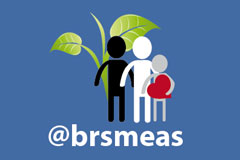 |
The Rotterdam and Stockholm scientific subsidiary bodies’ meetings - CRC13 and POPRC13 - successfully concluded recently in Rome, and the official Press Release is now online.
UN scientists recommend listing of 5 more chemicals
 FAO and UNEP experts pursue sound chemicals management to promote human and environmental health
Rome: 30 October 2017 In keeping with recent calls for commitments from all to contribute towards a pollution-free planet, experts and observers joined members of the Rotterdam (RC) and Stockholm (SC) Conventions’ chemical review committees for back-to-back meetings in Rome in recent days and reviewed a record number of chemicals for inclusion in annexes of the two Conventions, both of which aim to protect human health and the environment. Discussions concluded on 26th October and three more chemicals are recommended for inclusion in the Rotterdam Convention, whilst two more are recommended for inclusion in the Stockholm Convention.
More than 250 experts and observers in total, from all regions of the world, gathered at the headquarters of the Food and Agriculture Organization of the United Nations (FAO) in Rome to conduct back-to-back meetings focussed on the review of scientific information on toxic chemicals, with a view to recommending inclusion in the annexes of the two conventions, thus becoming regulated by international law.
According to the latest FAO data, international pesticide sales are valued at up to USD 480 billion a year. UNEP estimates that as many as three percent of those working in agriculture worldwide suffer from acute pesticide poisoning, with adolescents facing a higher risk.
The Rotterdam Convention - which currently has 159 Parties - provides an early warning on the trade of certain hazardous chemicals and pesticides, through the Prior Informed Consent (PIC) procedure, a mechanism that requires Parties to take informed decisions on the future import of these chemicals.
The 13th meeting of the Chemical Review Committee (CRC) of the Rotterdam Convention, which was held back-to-back with POPRC and which concluded on 26 October, successfully recommended to the COP the listing of phorate, acetochlor and hexabromocyclododecane in Annex III of the Convention.
Acetochlor, a selective herbicide, has been used on maize in Sahelian west African countries. It poses a high risk to aquatic organisms as well as long-term risks to herbivorous birds and to humans.
Phorate, a pesticide, has been used for example in Brazil as an insecticide in cotton, potato, coffee, beans and corn and is considered one of the most toxic organophosphate AChE inhibitors.
Hexabromocyclododecane - is a brominated flame retardant already listed in the Stockholm Convention in Annex A and used as a flame retardant additive to provide fire protection during the service life of vehicles, buildings or articles, as well as protection while stored and in selected electronic products.
In reflecting on keys to the successful meetings, William Murray, Executive Secretary of the Rotterdam Convention (RC) for FAO, concluded that “National capacity-building has contributed substantially to sound chemicals management, which is essential to sustainable agriculture and, ultimately, food security”.
“Notwithstanding the scientific and technical aspects of the work of the CRC, the outcomes are felt at a much wider spectrum of the global chemicals and wastes management agenda, including implications for human and environmental health, sustainable development, food security and socio-economic considerations” said Rolph Payet, Executive Secretary of the Basel, Rotterdam and Stockholm Conventions for UNEP. “These decisions will further protect human health and the environment from hazardous chemicals and will guide the international community towards not just a pollution-free planet, but also towards implementing the SDGs through the sound management of chemicals and waste” he added.
The Stockholm Convention - which currently has 181 Parties - aims to eliminate or restrict the use of chemicals referred to as “Persistent Organic Pollutants” (POPs), which are among the most toxic substances found on earth and thus posing serious threats to human health and the environment. The next step will be for the respective Conferences of the Parties to decide whether to formally list these chemicals at their next meetings in Geneva in April 2019.
The 13th meeting of the Stockholm Convention’s Persistent Organic Pollutants Review Committee (POPRC) met from 17 to 20 October, and recommended listing by the next COP of two highly toxic chemicals, namely dicofol, and PFOA, its salts & PFOA-related compounds, in respectively, Annex A and Annex A or B to the Convention. On PFOA, its salts and PFOA-related compounds, further work is expected by the Committee at its next meeting to define the need for possible specific exemptions for certain applications in the view of strengthening its recommendation to the COP.
Dicofol is an organochlorine pesticide structurally similar to DDT. Often used as a foliar spray on agricultural crops and ornamentals, and in or around agricultural and domestic buildings for mite control.
PFOA - or pentadecafluorooctanoic acid -, its salts and PFOA-related compounds are used in a wide variety of applications and consumer products across many sectors, e.g. semiconductor industry, imaging and printing industry, textiles, fire-fighting foam, medical devices.
The Committee was also satisfied that the proposal submitted for listing PFHxS, its salts and PFHxS-related compounds to the annexes of the Convention met the required criteria, moving this group of substances to the next stage of the listing process, which requires the development of a risk profile. PFHxS are used as a surfactant to make fluoropolymers and as water- and stain protective coatings for carpets, paper and textiles.
Stressing that the listing of chemicals into the Conventions’ annexes contributes to the broader international push for a pollution-free planet, BRS Deputy Executive Secretary Carlos Martin-Novella noted that such scientific processes “inform the global high-level political commitment on pollution, which will be negotiated at the forthcoming UN Environment Assembly in Nairobi, 4-6 December. This meeting, UNEA-3, has as its overarching vision a “world without pollution” and the sound management of chemicals and wastes feature as one of 6 sub-themes. Work from Committees such as this provides the foundation, the building blocks, for such grand and noble statements.”
The next meetings of the Conferences of Parties (COPs) for both conventions, together with that of the Basel Convention on the Control of Transboundary Movements of Hazardous Wastes and their Disposal, will be held in Geneva in April 2019.
ENDS
----------------------------------------------------------
Note for editors:
The Rotterdam Convention on the Prior Informed Consent Procedure for Certain Hazardous Chemicals and Pesticides in International Trade creates legally binding obligations for its currently 155 parties. It currently covers 50 chemicals, pesticides and pesticide formulations.
The Chemical Review Committee consists of thirty-one scientific experts appointed by the Conference of the Parties to the Rotterdam Convention charged with undertaking scientific review of chemicals proposed for listing.
More information on all the chemicals currently listed, or proposed and/or under review for listing, can be found on the Rotterdam Convention homepages www.pic.int or by contacting:
The Stockholm Convention on Persistent Organic Pollutants, or POPs, creates legally binding obligations for its 181 Parties and currently includes 26 chemicals listed within its annexes.
The POPs Review Committee consists of thirty-one scientific experts appointed by the Conference of the Parties charged with undertaking scientific review of chemicals proposed for listing.
More information on all the chemicals currently listed, or proposed and/or under review for listing, can be found on the Stockholm Convention homepages at www.chm.pops.int or by contacting:
- Kei OHNO WOODALL, Secretariat of the Basel, Rotterdam and Stockholm Conventions (UNEP), Geneva: +41-79-2333218, +41-22-917-78201, kei.ohno-woodall@brsmeas.org
- Charlie AVIS, Secretariat of the Basel, Rotterdam and Stockholm Conventions (UNEP), Geneva: +41-79-730-4495, charles.avis@brsmeas.org
|
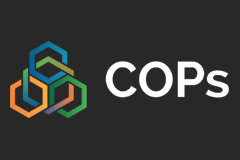 |
Countries make important progress towards goal of a safer planet.
#DETOX Outcomes: Additional chemicals listed, new partnership on household waste established, mandate given to tackle marine plastics
 Countries make important progress towards goal of a safer planet
May 5, Geneva – Significant steps were agreed upon by parties to the Basel, Rotterdam, and Stockholm Conventions (BRS), as the 2017 Triple COPs drew to a close in Geneva this week. Hosted under the headline, “A future detoxified: sound management of chemicals and waste,” participants reached consensus over a range of issues at the largest ever meeting of the Conventions to-date, attended by around 1,300 participants from more than 170 countries. Eighty ministers took part in high-level talks on the final days of the two-week-long event, which began on April 24.
The Basel, Rotterdam and Stockholm Conventions share the common objective of protecting human health and the environment from hazardous chemicals and wastes. All three Conventions made good progress on their stated targets of reducing dependence on toxic substances and promoting ecologically sound alternatives to pest control, paving the way towards a safer world. “We have seen a surge in positive commitments from governments. The relevance and importance of the BRS Conventions is therefore central to achieving sustainable development, the eradication of poverty and a peaceful and fair world. The sustainable management of chemicals and waste must be met, in order for our health and that of our children to be protected, wherever we live, and whatever our job, whatever our gender, nationality or income,” said UNEP’s Executive Secretary of the three Conventions, Rolph Payet.
The Basel Convention agreed a number of important decisions including the establishment of a new public-private Partnership on Household Waste, to assist countries deal with this issue of growing concern, and gave a mandate to begin tackling marine litter, a key challenge of our time.
By consensus, the Rotterdam Convention (RC) added three new chemicals to Annex III. These are two pesticides, carbofuran and trichlorfon, and one industrial chemical, short-chain chlorinated paraffins (SCCPs) – traces of which have been found in air, waterways and sediments. The addition of these highly toxic substances brings the total number of chemicals listed under the RC to fifty one. The COP also added tributyltin (TBT) under industrial chemicals category in addition to pesticides category. No agreement was reached, however, on chrysotile asbestos, carbosulfan, and pesticide formulations paraquat dichloride formulations and fenthion, although many Parties expressed their willingness to do so in order to ensure the best information exchange on these hazardous chemicals. Listing does not constitute a ban, but does however enable Parties to make informed decisions on future imports of these chemicals, based on a structured information exchange, also called the Prior Informed Consent (PIC) Procedure.
“It is clear that agriculture in 2017 and beyond must produce more, while at the same time protecting and enhancing the underlying natural resources on which it is based. The need for more varied, specialized and innovative approaches, that draw on traditional knowledge and advances in science and technology will only be addressed through greater collaboration and cooperation at all levels,” said FAO’s Executive Secretary of the Rotterdam Convention (RC), William Murray. Achieving global food security and improved livelihoods for all requires a sustainable approach to the intensification of agricultural production. Healthy soil, clean water supplies and biologically diverse ecosystems are essential components in building a detoxified future.
The Stockholm Convention succeeded in listing all of the Persistent Organic Pollutants (POPs) which had been recommended, namely decaBDE and short-chain chlorinated paraffins (SCCPs) in Annex A and hexachlorobutadiene (HCBD) in Annex C. In listing, these substances will now be reduced and eliminated, for the benefit of current and future generations.
The safe management of chemicals and wastes are essential for the implementation of the UN’s Sustainable Development Goals (SDGs) on poverty reduction, health, gender, water, cities, oceans, food and sustainable consumption and production.
The role of the private sector was prominent throughout, including at the first ever Technology Fair which showcased solutions for implementing the three conventions. Parties renewed their commitment to work together, enhance efficient implementation of the conventions and strengthen synergies for a detoxified future.
For more information
For technical information: Kei Ohno-Woodall (+41 79 233 3218), kei.ohno-woodall@brsmeas.org
For technical information on the Rotterdam Convention: Christine Fuell (+39 06 5705 3765) christine.fuell@fao.org
For general info, to arrange interviews, etc: Charlie Avis (+41 79 730 4495), charles.avis@brsmeas.org
Notes to editors on the listed chemicals:
Newly-listed under the Rotterdam Convention
Carbofuran: an insecticide with trade name Furadan used to control soil insects in fruit and vegetable production, with negative impacts upon the environment including on birds, small mammals, and bees.
Trichlorfon: an insectide or pesticide with trade name Cekufon 80 SP in Europe, Dipterex in Brazil and others, used on fruits and vegetables causing acute neurotoxic and carcinogenic effects and impacts on human reproduction and the endocrine system.
Short-chain chlorinated paraffins (SCCPs): an industrial chemical with numerous trade names including Chlorowax, A70 (wax) and Chlorofo, used as a softener in paints, plastics fillers and coatings and as a flame inhibitor in rubber, plastics and textiles - traces of which have been found in air, waterways and sediments posing particular risks to soil and water-dwelling organisms.
Tributyltin compounds (TBT): a pesticide/industrial chemical with trade name Biomet and Intersmooth, used most commonly in anti-fouling paints for ship hulls, and as biocide in wood preservatives
Newly-listed under the Stockholm Convention
Decabromodiphenyl ether (commercial mixture, c-DecaBDE): an intentionally produced chemical used an additive flame retardant including in plastics, textiles, adhesives, sealants, coatings and inks. C-decaBDE containing plastics are used in electrical and electronic equipment, wires and cables, pipes and carpets, transported over long-range and with significant adverse human health and environmental effects, including adverse effects to reproductive health and output in a number of species as well as developmental and neurotoxic effects, and endocrine disruption.
Short-chain chlorinated paraffins (SCCPs): see above as per Rotterdam Convention.
Hexachlorobutadiene (HCBD): a Persistent Organic Pollutant already listed under Annex A of the Stockholm Convention, now additionally listed under Annex C, most commonly used as a solvent for other chlorine-containing compounds causing systemic toxicity following exposure via oral, inhalation, and dermal routes. Effects may include fatty liver degeneration, epithelial necrotizing nephritis, central nervous system depression and cyanosis.
|
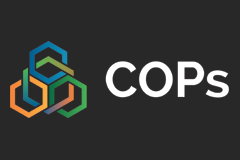 |
1,500 participants, 180 countries, 3 conventions, 2 weeks, but just 1 goal: A Future Detoxified. Download the official Press Release here.
The 2017 Triple COPs are open – Press Release now online
 1,500 participants, 180 countries, 3 conventions, 2 weeks, 1 goal: A Future Detoxified
24 April 2017, Geneva – Over 1,600 representatives from more than 180 countries as well as observers including from civil society groups and the chemical and waste industries are gathering in Geneva to discuss measures to promote the sound management of chemicals and wastes.
The two week-long Triple Conferences of the Parties (COPs) to the Basel, Rotterdam and Stockholm (BRS) Conventions aims to strengthen the three international treaties contributing to the global management of hazardous chemicals and waste.
"Chemicals constitute the building blocks of modern life. But without ensuring the environmentally sound management of chemicals and the phase-out of especially hazardous substances, we will continue to see more lives lost to poisoning, contamination and pollution. What we need to address this crisis is stronger regulatory action taken at national and international levels. That is why this meeting of the parties to the Basel, Rotterdam and Stockholm conventions is so critical. Only through cooperation and collaboration can we hope to create a detoxified future for everyone," said Ibrahim Thiaw, UN Environment Deputy Executive Director.
UNEP Executive Secretary of the three Conventions, Rolph Payet, reminded government delegates that, “more than ever, the people of this planet are counting on you, representatives of governments and Parties to the Conventions, to make the right decisions; decisions which will lead to improved quality of life for our people and for a sustainable planet. Negotiations taking place here should enable us to tackle this nexus between development and planetary health.”
Staged under the theme “A future detoxified: sound management of chemicals and waste,” Parties will seek to reach consensus over a range of issues. For the Rotterdam Convention (RC), this includes eight proposals for adding carbofuran, carbosulfan, trichlorfon, fenthion, paraquat, chlorinated paraffins, chrysotile asbestos and tributyltin to the RC’s “watch list” – also known as Annex III. Forty-seven chemicals make up the current list of substances deemed hazardous to human health and the environment and which are subsequently subject to the Prior Informed Consent (PIC) Procedure. Parties will also consider ways to strengthen the effectiveness of the Convention and seek to adopt compliance procedures and mechanisms.
“FAO and UNEP each provide unique expertise to support Parties to address the challenges of managing hazardous chemicals and pesticides. They also help countries to streamline the UN Sustainable Development Goals (SDGs) into their national agendas. This Conference is an excellent occasion to work together to build on the impressive results we have already achieved” said FAO’s Deputy Director for the Plant Production and Protection Division and Co-Executive Secretary of the Rotterdam Convention (RC), William Murray.
For the Stockholm Convention, issues include proposals for listing decabromodiphenyl ether (commercial mixture, c-decaBDE) and short-chain chlorinated paraffins in Annex A for elimination as well as hexachlorobutadiene (HCBD) in Annex C which targets the reduction and ultimate elimination of the unintentional releases of the chemical. Among the other issues that will get priority attention of Parties to the Stockholm Convention (SC) is the development of compliance procedures and mechanisms, and the first ever evaluation of the effectiveness of the Convention. The Conference will consider the progress the Convention is making in achieving its objective of protecting human health and the environment from Persistent Organic Pollutants (POPs), measured against a framework of indicators provided by the COPs.
For the Basel Convention (BC), the COPs will consider prevention and minimization of the generation of waste which is the subject of new guidance to assist Parties, and a set of practical manuals for the promotion of the environmentally sound management of wastes and revised fact sheets on specific waste streams all of which have been prepared by an expert group on environmentally sound management. Other work under consideration includes two new and four updated technical guidelines for Environmentally Sound Management (ESM) of POPs, a glossary of terms to provide further legal clarity and guidance on dealing with illegal traffic developed by the Implementation and Compliance Committee. Parties will also consider establishing a new partnership focusing on a major waste stream, household waste.
The Conferences will also examine progress in the implementation of the Conventions among participating Parties, in particular in developing countries and countries in transition where handling hazardous chemicals throughout their lifecycles presents greater challenges. Those attending will attempt to make progress on the sharing of information on hazardous chemicals and strive to build further international cooperation and coordination regarding their usage.
More than 40 side events will be held during the biennial event. Among the topics being presented are mercury waste management, pesticide risk reduction, hazardous work in agriculture, child labour and methods to safeguard the human rights of those facing exposure. A technology fair will highlight the importance partners such as industry and private sector groups play in developing new technologies for the safe management of chemicals and promoting opportunities for developing alternatives.
On May 4 and 5, government ministers and delegates will participate in a high-level session to discuss themes ranging from creating a detoxified future; to meeting the targets of the 2030 Agenda for Sustainable Development; generating greater opportunities to implement the Conventions through partnerships; and techniques to cut waste and pollution while facilitating economic and social prosperity.
Achieving SDG 12 – which sets out to secure the environmentally sound management of chemicals and all wastes throughout their life cycle, in order to minimize their adverse impacts on human health and the environment – will take centre stage.
For more information
For technical information: Kei Ohno-Woodall (+41 79 233 3218), kei.ohno-woodall@brsmeas.org
For technical information on the Rotterdam Convention: Christine Fuell (+39 06 5705 3765) christine.fuell@fao.org
For general info, to arrange interviews, etc: Charlie Avis (+41 79 730 4495), charles.avis@brsmeas.org
|
 |
The outcomes of the recent Rotterdam Convention CRC-12 and Stockholm Convention POPRC-12 meetings are now available online, featuring proposed new chemicals listings at the COPs in Geneva in 2017.
Press Release: UN chemical experts pave way for more sustainable management of chemicals
 PRESS RELEASE : For a FUTURE DETOXIFIED
UN chemical experts pave way for more sustainable management of chemicals
Geneva & Rome: 26 September 2016 - Experts and observers joined members of the Rotterdam (RC) and Stockholm (SC) Conventions’ Review Committees in Rome in recent days to consider available scientific evidence concerning a number of hazardous chemicals for inclusion in annexes of the two Conventions, both of which aim to protect human health and the environment.
The Rotterdam Convention – which currently has 155 Parties – provides an early warning on the trade of certain hazardous chemicals and pesticides, through the Prior Informed Consent (PIC) procedure, a mechanism for disseminating the decisions of importing Parties. The Stockholm Convention – with currently 180 parties – aims to eliminate the use of certain toxic chemicals, specifically those referred to as “Persistent Organic Pollutants” (POPS). The latter obliges governments to regulate the production, use and trade of specific chemicals throughout their life cycles.
The 12th meeting of the Chemical Review Committee (CRC) of the Rotterdam Convention, which concluded on 16 September, agreed to recommend the listing of carbofuran suspension concentrate 330 g/L as a severely hazardous pesticide formulation in Annex III of the Convention, following a proposal from Colombia. The meeting also finalized draft decision guidance documents on two highly toxic pesticides – carbofuran and carbosulfan – used to control insects in a wide variety of crops.
The next step will be for the Conference of the Parties at its meeting in 2017 to decide whether to list these two pesticides in Annex III of the Convention and subject them to the PIC procedure. 47 chemicals are currently listed in the Annex, including pesticides and industrial chemicals that have been banned or restricted by two or more Parties.
“It is important to note that the basis for the consideration of these pesticides by the CRC were decisions taken by developing countries. Decisions that are leading to action at the global level,” said William Murray, Executive Secretary of the Rotterdam Convention (RC) for the FAO.
According to the latest FAO data, international pesticide sales are valued at up to USD 480 billion a year. UNEP estimates that as many as three percent of those working in agriculture worldwide suffer from acute pesticide poisoning, with adolescents facing a higher risk.
When used appropriately, pesticides can help to protect food and other crops from excessive damage by pests and diseases. They can also protect humans and livestock from diseases. Misuse of pesticides however, is not only a threat to those earning a living through farming but also to the environment and the economy.
The Stockholm Convention’s Persistent Organic Pollutants Review Committee (POPRC) then staged its 12th meeting, back-to-back with the CRC, and concluded its work on 23 September by agreeing to propose two new industrial chemicals for inclusion in the Convention’s annexes.
Short-chain chlorinated paraffins (SCCPs) are mostly used in manufacturing of products such as polyvinyl chloride (PVC) plastics, and used in metalworking fluids. These highly persistent and toxic compounds have been found in breastmilk of Inuit women in the Arctic, demonstrating their persistence and long-range environmental transport. Listing in Annex A for elimination by the COP is proposed.
The Committee considered and adopted additional information for decabromodiphenyl ether (commercial mixture, c-decaBDE), widely used as flame retardants, defining necessary specific exemptions related to automotive industry, for this chemical’s listing in Annex A of the Convention by the COP.
The Committee evaluated the new information on hexachlorobutadiene (HCBD) and concluded that there are unintentional releases of HCBD from the certain chemical production processes and incineration processes. In 2013, the Committee recommended listing of HCBD in Annexes A and C and in 2015, the COP listed it in Annex A. Annex C lists chemicals subjects to the measures to reduce or eliminate releases from unintentional production.
Progress was also made on pentadecafluorooctanoic acid (PFOA, or perfluorooctanoic acid), its salts and PFOA-related compounds, and dicofol, for which the Committee adopted the respective Draft Risk Profiles, moving them to the next review stage, requiring a risk management evaluation that includes an analysis of possible control measures. Finally, the Committee endorsed the guidance on alternatives to perfluorooctane sulfonic acid (PFOS) and its related chemicals to assist countries in phasing-out of those chemicals listed under the Convention.
“Both the CRC and POPRC meetings were effective and productive and have paved the way for important decisions to be taken at our triple COPs in April next year,” said Rolph Payet, Executive Secretary of the Basel, Rotterdam and Stockholm Conventions for UNEP. “These decisions will further protect human health and environment from hazardous chemicals and will guide the international community towards not just a future detoxified, but also towards implementing the SDGs through the sound management of chemicals and waste” he added.
The next meetings of the Conferences of Parties (COPs) for both conventions, together with that of the Basel Convention on the Control of Transboundary Movements of Hazardous Wastes and their Disposal, will be held in Geneva from 24 April to 5 May 2017 under the title “A Future Detoxified: Sound Management of Chemicals and Waste”.
Note for editors:
The Rotterdam Convention on the Prior Informed Consent Procedure for Certain Hazardous Chemicals and Pesticides in International Trade creates legally binding obligations for its currently 155 parties. It currently covers 47 chemicals, pesticides and pesticide formulations.
The Chemical Review Committee consists of thirty-one scientific experts appointed by the Conference of the Parties to the Rotterdam Convention charged with undertaking scientific review of chemicals proposed for listing.
Carbofuran is a WHO class Ib pesticide and used to control insects in a wide variety of field crops, including potatoes, corn and soybeans. It is extremely toxic via the oral route and by inhalation (LD50 2 mg/kg in mice[1]) . It is also highly toxic to freshwater invertebrates and extremely toxic to birds.
Carbosulfan is a broad-spectrum carbamate insecticide used to control various insects, including locusts and different types of grasshoppers, mites and nematodes mainly on potatoes, sugar beet, rice, maize and citrus. It is highly toxic to birds, aquatic invertebrates and bees[3].
For more information, please contact:
For CRC/Rotterdam Convention: www.pic.int
Christine FUELL, Secretariat of the Rotterdam Convention (FAO), Rome: + 39-06-5705-3765, christine.fuell@fao.org
Erwin NORTHOFF, Chief of Corporate Communications (FAO), Rome: + 39-06-5705-3105, erwin.northoff@fao.org
The Stockholm Convention on Persistent Organic Pollutants, or POPs, creates legally binding obligations for its 180 parties and currently includes 26 chemicals listed within its annexes.
The POPs Review Committee consists of thirty-one scientific experts appointed by the Conference of the Parties charged with undertaking scientific review of chemicals proposed for listing.
More information on all the chemicals currently listed, or proposed and/or under review for listing, can be found on the Stockholm Convention homepages at: www. chm.pops.int
Kei OHNO WOODALL, Secretariat of the Basel, Rotterdam and Stockholm Conventions (UNEP), Geneva: +41-79-2333218, +41-22-917-78201, kei.ohno-woodall@brsmeas.org
Charlie AVIS, Secretariat of the Basel, Rotterdam and Stockholm Conventions (UNEP), Geneva: +41-79-730-4495, charles.avis@brsmeas.org
|
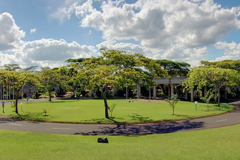 |
A Press Release is now available summarising major outcomes of the OEWG-10 and ICC-12 meetings, held in Nairobi from 30 May to 2 June and 4 to 6 June 2016, respectively.
Basel Convention meetings point way forwards for sustainable management of waste
 Important technical and legal steps were taken by two subsidiary bodies of the Basel Convention last week at meetings held in Nairobi, Kenya. The Basel Convention’s OEWG is at the heart of efforts to reach several of the 2030 sustainable development goals, while the ICC is central to measuring progress towards these goals. Highlights of these meetings include progress towards the establishment of a new public-private global partnership on household waste; progress on defining guidance to countries on the environmentally sound management of E-waste and POPs waste; and progress with 12 specific submissions concerning individual Parties’ compliance and on a range of other issues of implementation and compliance with the Convention.
Held back-to-back with the 2nd United Nations Environment Assembly, UNEA2, the 10th meeting of the Open-ended Working Group of the Basel Convention (OEWG-10) took place from 30 May to 2 June and focused on the development of guidelines that promote the environmentally sound management (ESM) of wastes and on improving national reporting. Some 210 experts gathered from all over the world, including representatives from national governments, international organizations, civil society and the private sector. With funding support provided by Denmark, Germany, Finland, Japan and Sweden, strong inputs were secured from developing countries.
OEWG10 - 13 decisions for more sustainable management of waste
A series of concrete steps were agreed, through the adoption of 13 decisions setting direction for further work on waste management until the next Conference of Parties, COP-13, which will be held in Geneva in April 2017. The OEWG provides a leadership role in the development of the technical guidelines for the ESM of specific wastes types or waste streams, which are especially useful in national waste management activities. OEWG-10 passed decisions relating to guidelines on the three newly-listed persistent organic pollutants (POPs) in the Stockholm Convention; and guidelines on e-waste, the fastest growing waste stream in the world today.
In particular, OEWG-10 adopted decisions agreeing ways forward for:
- Preparation of the mid-term evaluation of the strategic framework;
- Developing guidelines for environmentally sound management (ESM);
- The Cartagena Declaration on Prevention, Minimization and Recovery of Hazardous Wastes and Other Wastes
- Technical guidelines on persistent organic pollutant (POP) wastes;
- Technical guidelines on e-waste, including on further work before COP-13;
- National reporting;
- Providing further legal clarity;
- Consultation with the Committee Administering the Mechanism for Promoting Implementation and Compliance on guidance on the Basel Convention provisions dealing with illegal traffic;
- Follow-up to the Partnership for Action on Computing Equipment (PACE);
- The creation of a new partnership for the ESM of household wastes;
- Cooperation between the Basel Convention and the International Maritime Organization (IMO);
- Cooperation with the World Customs Organization (WCO) on the Harmonized Commodity Description and Coding System; and
- The work programme for the OEWG for 2018-2019.
Fast-growing wastestream
It is estimated that, by 2018, there will be 50 million metric tonnes of e-waste produced per year, far-outstripping current capacities to properly manage it in an environmentally and socially appropriate manner. E-waste is a fast-growing wastestream and poses a number of serious threats to human health and the environment. Conversely, if undertaken in an environmentally sound manner, e-waste recycling can offer sustainable livelihoods, green and decent work, and contribute to the development of a circular economy and the transition to a greener, more inclusive economy. The E-waste technical guidelines are designed to assist governments protect human health and the environment through sound management of waste, and also offer important clarification regarding the question of “what is waste” in order to guide receiving and sending countries as to which types of product constitute e-waste and therefore fall under the jurisdiction of the Basel Convention.
For more on the outcomes of this meeting, including the technical guidelines and other OEWG products, please go to our website.
ICC-12 – The Basel Convention’s Implementation and Compliance Committee
The 12th meeting of the Implementation and Compliance Committee of the Basel Convention (ICC-12)) took place on 4-6 June 2016, under the chairmanship of Mr Juan Simonelli (Argentina).
The goal of the Basel ICC is to assist Parties implement and comply with the Convention. ICC-12 considered twelve specific submissions regarding Party implementation and compliance. Among other things, the ICC decided that the compliance matters regarding Afghanistan and Togo were resolved, it approved two compliance action plans submitted respectively by Eritrea and Liberia as well as new compliance action submitted by Togo, and it monitored the progress made by Bhutan, Cabo Verde, Central African Republic, Guinea-Bissau and Swaziland in implementing their compliance action plans with the support of the implementation fund.
ICC-12 also made progress on all the general issues of implementation and compliance under its work programme. It reached conclusions on:
- The development of guidance on illegal traffic;
- Further work towards the development of guidance on insurance, bond and guarantee;
- The classification of individual compliance performance with the national reporting obligation for 2013;
- Steps to improve the completeness and timeliness of national reporting, including a side event on national reporting during COP-13;
- Key issues pertaining to transit transboundary movements;
- The initiation of work towards the development of electronic approaches to the notification and movement documents; and
- Measures to improve the development of adequate national legal frameworks.
For more on the outcomes of this meeting, please go to our website.
------------------------------------
Notes for editors:
- The Basel Convention on the Control of Transboundary Movements of Hazardous Wastes and their Disposal is the most comprehensive international environmental agreement on hazardous and other wastes and has 183 parties. See www.basel.int.
- The Secretariat of the Basel, Rotterdam, and Stockholm Conventions, or BRS, supports parties implement the three leading multilateral environment agreements governing chemicals and waste, in order to protect human health and the environment. See www.brsmeas.org.
For more information, please refer to:
Website: www.brsmeas.org.
BRS Secretariat:
Kei Ohno-Woodall
Programme Officer, for OEWG-10
kei.ohno-woodall@brsmeas.org
Tel: +41-22-9178364
Juliette Voinov Kohler
Legal officer, for ICC-12
Juliette.kohler@brsmeas.org
Tel: +41-22-9178219
BRS Press
Charlie Avis, Public Information Officer
Charles.avis@brsmeas.org
Tel: +41-79-7304495
|
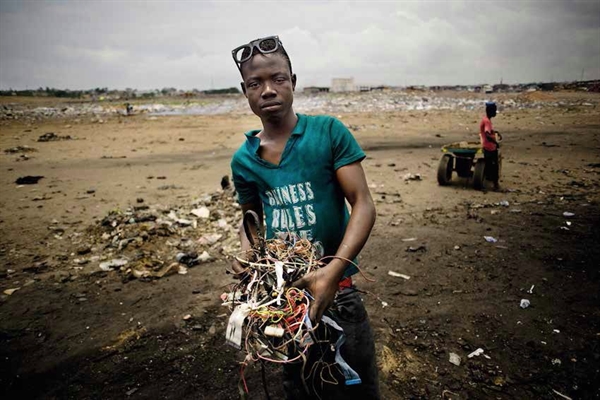 |
The Secretariat of the Basel, Rotterdam, and Stockholm Conventions (BRS), together with its partner the European Institute for Innovation and Technology’s Climate Knowledge and Innovation Community (Climate-KIC), is proud to launch the first-ever Massive Open Online Course, or MOOC, on the electronic and electrical waste, e-waste challenge.
BRS and Climate-KIC launch first-ever Massive Open Online Course (MOOC) on e-waste
 The Secretariat of the Basel, Rotterdam, and Stockholm Conventions (BRS), together with its partner the European Institute for Innovation and Technology’s Climate Knowledge and Innovation Community (Climate-KIC), is proud to launch the first-ever Massive Open Online Course, or MOOC, on the electronic and electrical waste, e-waste challenge.
It is estimated that, by 2018, there will be 50 million metric tonnes of e-waste produced per year, far-outstripping current capacities to properly manage it in an environmentally and socially appropriate manner.
According to Achim Steiner, Executive Director of the UN Environment Programme, in his introductory video address to the MOOC, “In many countries women and children form up to 30% of the workforce in crude, e-waste processing and are therefore particularly vulnerable. When women and girls are affected in this way as the mothers of today and tomorrow, our common future is affected too. This MOOC will introduce you to the challenge of e-waste and especially to its environmentally sound recycling. The course will take you from the problem, to opportunities, and to possible actions at local, regional and national levels, and will guide you through policy tools and best practices for the collection, recycling, and final disposal of e-waste.”
Ebrahim Mohamed, Climate-KIC’s education director, added: “Our MOOC highlights that e-waste is a societal challenge that also is part of larger opportunity to create a prosperous zero carbon future, driven by innovation, jobs, and investment. Climate-KIC is seizing that opportunity by connecting both public and private sectors with climate change-focused education, research and innovation. Ideas are the oxygen of growth in the zero carbon economy, and I am convinced that this collaboration with UNEP will spark many new ones.”
Fast-growing waste stream
E-waste is a fast-growing waste stream in the world and poses a number of serious threats to human health and the environment. Conversely, if undertaken in an environmentally sound manner, e-waste recycling can offer sustainable livelihoods, green and decent work, and contribute to the development of a circular economy.
The course opens on Monday 4th April, and is aimed at students and researchers, policy makers, practitioners, entrepreneurs, e-waste recyclers and government officials and invites participants to become part of the solution to this growing problem. Relevant for developed and developing countries alike, the 8-week programme covers all aspects of e-waste with a view to turn the threat of this global tsunami of e-waste into an opportunity.
The MOOC explores and explains the Basel Convention technical guidelines on transboundary movements of e-waste which were adopted on an interim basis at the last Conference of the Parties (COP) in May 2015, and which provide much-needed guidance on how to identify e-waste and used equipment moving between countries, with the aim of controlling illegal traffic.
E-waste is categorized as hazardous waste due to the presence of toxic materials such as mercury, lead and brominated flame retardants which include some polybrominated diphenyl ethers listed in the annexes to the Stockholm Convention, considered as hazardous waste according to the Basel Convention.
E-waste may also contain precious metals such as gold, copper and nickel and rare materials of strategic value such as indium and palladium. These precious and heavy metals could be recovered, recycled and used as valuable source of secondary raw materials. It has been documented that e-wastes are shipped to developing countries where it is often not managed in an environmentally sound manner, thus posing a serious threat to both human health and the environment.
The MOOC has been developed in partnership by the Secretariat of the Basel, Rotterdam and Stockholm conventions, Climate-KIC, the University of Leuven (KU Leuven, Belgium),and the World Resources Forum.
All interested participants are invited to pre-register at the website www.learning.climate-kic.org/courses/e-waste-mooc
Notes for editors:
The Basel Convention on the Control of Transboundary Movements of Hazardous Wastes and their Disposal is the most comprehensive international environmental agreement on hazardous and other wastes and has 183 parties. See www.basel.int
The Secretariat of the Basel, Rotterdam, and Stockholm Conventions, or BRS, supports parties implement the three leading multilateral environment agreements governing chemicals and waste, in order to protect human health and the environment. See www.brsmeas.org
Climate-KIC (Climate Knowledge and Innovation Community) is the EU’s largest public private partnership addressing climate change through innovation to build a zero carbon economy. They run programmes for students, start-ups and innovators across Europe via centres in major cities, convening a community of the best people and organisations. Their approach starts with improving the way people live in cities. Their focus on industry creates the products required for a better living environment, and they look to optimise land use to produce the food people need. Climate-KIC is supported by the European Institute of Innovation and Technology (EIT), a body of the European Union. See www.climate-kic.org
For more information, please refer to:
Website: www.brsmeas.org
BRS Secretariat – Francesca Cenni, Programme Officer, francesca.cenni@brsmeas.org tel: +41-22-9178364
BRS Press – Charlie Avis, Public Information Officer, Charles.avis@brsmeas.org tel: +41-79-7304495
|
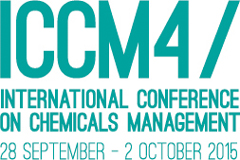 |
Outcomes of the 4th International Conference on Chemicals Management, featuring governments, civil society, and private sector, 28 September to 2 October in Geneva.
Read the ICCM4 Press Release
 Achieving sound management of chemicals could prevent over 1 million deaths per year globally and massively contribute to realizing the Sustainable Development Goals.
Geneva, 2 October 2015–Over 800 delegates, including ministers, CEOs, heads of intergovernmentalorganizations and leaders of civil society, meeting at the 4th International Conference on Chemicals Management (ICCM4), committed today to step up action to safeguard people and the environment from the risk posed by inadequately managed chemicals.
Of the estimated 100,000+ chemicals on the market today, only a fraction has been thoroughly evaluated to determine their effects on human health and the environment. The World Health Organization (WHO) estimates that exposure to chemicals contributes to over 1 million deaths annually.
The infant death rate from environmental causes overall is 12 times higher in developing than in developed countries while childhood lead exposure is estimated to contribute to about 600,000 new cases of children with intellectual disabilities every year.
ICCM4 concluded with a commitment to invest in efforts to prevent these deaths and illnesses by assuring sound chemicals management throughout their lifecycleby 2020.
Achieving that goal would be a milestone toward realizing the historic 2030 Sustainable Development Agenda adopted by 193 countries last week, and containing goals on human health and well-being, food security, sustainable consumption and production, and water and sanitation – all issues directly affected by chemicals.
Addressing delegates at the conference, Mr. Achim Steiner, Executive Director of the United Nations Environment Programme (UNEP), stressed the challenges and opportunities of sound chemicals management, and the growing need for innovative partnerships and better information and knowledge.
Mr. Steiner said: “Chemicals are a part of our lives that we cannot do without. That’s precisely whywe need to fundamentally rethink how chemicals are developed and managed for industrial and commercial applications. Seeking out ad hoc alternatives to toxic chemicals is a Sisyphean effort. To tackle the challenge of green or sustainable chemistry at its root, we will need a shift in mindset and education so that the chemistry of tomorrow is sustainable from the start.”
Dr. Richard Lesiyampe, Principal Secretary in the Ministry of Environment and Natural Resources, Kenya, and President of ICCM4 said:“Projections show an increase in chemical production and use worldwide, with developing countries expected to produce and use by 2020 around 31 per cent and 33 per cent of global chemicals respectively.
"In building a chemical-safe future, we will address some of the most pressing issues that emerge as part of the sustainable development challenge including the need for increased capacity to address, prevent and manage aftermaths of chemical incidences. Strong capacity for governance, knowledge and information-sharing, and risk reduction will also be needed,”
Representatives of the global chemical business at the conference included the International Council of Chemical Associations (ICCA), which has led the
“Responsible Care Global Charter”, promoting responsible management of chemicals throughout their lifecycle. UNEP and ICCA agreed to strengthen their partnership for a chemical-safe future.
Mr. Cal Dooley, President and CEO of the American Chemistry Council and ICCA Council Secretarysaid: “ICCA is committed to advancing SAICM implementation and promoting the sustainable and effective management of chemicals globally. Through our strengthened partnership, ICCA and UNEP will continue to work together to develop guidance for countries around the world so they can enhance and improve their chemical management systems.”
Well-represented at the conference, civil society has an indispensable role to play in achieving a chemical-safe world by gathering and sharing information, building capacity and empowering those who work with, or are affected by, chemicals everyday.
Dr. OlgaSperanskaya, International POPs Elimination Network (IPEN) Co-Chair said: “Goodwill alone will not minimize adverse effects on the people most impacted by chemical exposure – women, children, workers, impoverished communities. Increased financial resources and a sense of urgency are needed if we are going to make progress - curb cancer and other diseases linked to unsound chemical management practices. We call on everyone involved – governments, international agencies, industry, and civil society – to make chemical safety a priority."
The conference concentrated on five priority policy issues requiring urgent action to protecthuman health and lives - lead in paint, endocrine-disrupting chemicals, chemicals in products, nanotechnology, and hazardous substances in the lifecycle of electronics and electrical products - and went further, by addingenvironmentally persistent pharmaceutical pollutants this week.
In addition, discussions on highly hazardous pesticides (HHPs) which pose particular risks to children and have caused health problems and fatalities in many parts of the worldled toa decision topromote ecological alternatives and strengthennational legislation regarding the use of HHPs.
ICCM4 closed by adopting a global plan of action for sound management of chemicals by 2020, which proposes concrete interventions, promotes implementation of existing legal instruments and addresses emerging policy issues.
NOTES TO EDITORS
About ICCM
ICCM is the governing body of the Strategic Approach to International Chemicals Management (SAICM). SAICM - to which UNEP provides the Secretariat - is a policy framework to promote chemical safety around the world. It is unique for bringing together multiple sectors and stakeholders to address chemicals and waste issues that are not already within the scope of legally binding agreements.
SAICM has as its overall objective the achievement of the sound management of chemicals throughout their life cycle so that, by 2020, chemicals are produced and used in ways that minimize significant adverse impacts on human health and the environment. This “2020 goal” was adopted by the World Summit on Sustainable Development in 2002 as part of the Johannesburg Plan of Implementation.Objectives are grouped under five themes: risk reduction; knowledge and information; governance; capacity-building and technical cooperation; and illegal international traffic.
For more information, visit www.saicm.org
For more information, please contact:
Isabelle Valentiny, Head of Communications, Regional Office for Europe, UNEP Geneva, +41 22 917 8404 or isabelle.valentiny@unep.org;
Lisa-maria.Hadeed@unep.org +41 79 372 1346
|
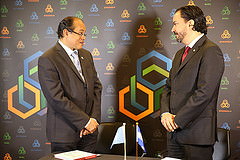 |
A special ceremony during the 2015 Triple COPs marked the submission by Honduras of its National Implementation Programme (article in Spanish).
Honduras the first in Latin American to submit its revised NIP
 "Source: Honduras – Secretaria de Relaciones Exteriores y Cooperación International"
El Embajador de Honduras en Ginebra, Giampaolo Rizzo Alvarado hizo entrega del Plan Nacional de Implementación del Convenio de Estocolmo (PNI), al Secretario de los convenios Rolph Payet.
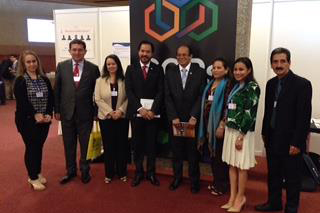
Jacqueline Álvarez, Alfredo Cueva, Ana Gabriela
Ramírez, Embajador Giampaolo Rizzo-Alvarado,
Secretario Rolph Payet, Emérita Ávila, María José
Mejía y Marco Tulio Cálix
Ginebra, Suiza. Destacada participación de Honduras en Ginebra, Suiza durante la 12va Conferencia de las Partes del Convenio de Basilea (COP 12), la 7ma Conferencia de las Partes del Convenio de Rotterdam (COP 7) y la 7ma Conferencia de las Partes del Convenio de Estocolmo (COP 7), que tuvieron por tema “De la ciencia a la acción, trabajando por un mañana más seguro”, y donde se desarrollaron importantes discusiones sobre la importación, utilización y disposición final de ciertos productos químicos; el control de los movimientos transfronterizos de desechos peligrosos y su eliminación, la protección de la salud humana y del medio ambiente frente a los Contaminantes Orgánicos Persistentes (COPs).
De las Triple COP desarrolladas en Ginebra, Suiza del 05 al 15 de mayo, resultaron guías técnicas para el manejo de desechos bajo la Convención de Basilea, cuatro nuevos químicos enlistados y otros más que serán sujetos a sesiones especiales de grupos de trabajo, de cara a la próxima Conferencia de las Partes, que se celebrará en 2017 también en Ginebra.
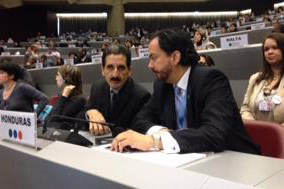
Marco Tulio Cálix junto al Embajador
Giampaolo Rizzo-Alvarado Honduras estuvo representado por el Asesor Legal de CESCCO y Coordinador de Movimientos Transfronterizos del Convenio de Basilea en Honduras, Marco Tulio Cálix; la Coordinadora del Convenio de Estocolmo sobre Contaminantes Orgánicos Persistentes (COPs), Ana Gabriela Ramírez; la Coordinadora del Convenio de Rotterdam en Honduras Emérita Ávila y la Misión Permanente de Honduras en Ginebra.
Fue en el marco de estas conferencias que la delegación de Honduras expuso los avances realizados en el cumplimiento e implementación de dichos convenios. Solamente en 2015, el país ha eliminado 70 toneladas de plaguicidas que contienen COPs y se estarán exportando 110 toneladas de Bifenilos Policlorados, contenidos en los residuos de la red de generación y distribución de energía eléctrica.

Secretario Rolph Payet, Embajador Giampaolo
Rizzo-Alvarado y Alfredo Cueva de ONUDI Los funcionarios hondureños tuvieron la oportunidad de compartir su experiencia en la ejecución del proyecto “Fortaleciendo el manejo de capacidades nacionales y la reducción de emisiones de COPs en Honduras”, con la delegación de Ecuador, encabezada por el Director Nacional de Control Ambiental Marco V. Enrique, del Ministerio de Ambiente, quien también mostró un gran interés en conocer el funcionamiento de Comisión Nacional para la Gestión Medioambiental de Productos Químicos (CNG), creada por decreto ejecutivo en 2014.
La Dra. Ana Gabriela Ramírez, junto con la Ing. Emérita Ávila y el Abg. Marco Tulio Cálix, se reunieron a su vez con la Señora Lady Virginia Traldi Meneses de la Compañía Ambiental del Estado de Sao Paulo (CETESB) y del Centro Regional del Convenio de Estocolmo sobre Contaminantes Orgánicos Persistentes para la Región de América Latina y el Caribe, con quien discutieron las bases para un próximo convenio de asistencia técnica relacionado con COPs y el mercurio.
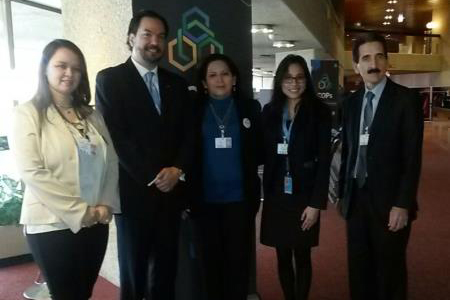
Ana Gabriela Ramírez, Embajador Giampaolo
Rizzo Alvarado, Emérita Ávila, María José Mejía,
Marco Tulio Cálix Finalmente, en cumplimiento de estos convenios, el Embajador Giampaolo Rizzo-Alvarado, hizo entrega en nombre del Ministro de Energía, Recursos Naturales, Ambiente y Minas MIAMBIENTE José Antonio Galdámez, de la segunda versión del Plan Nacional de Implementación del Convenio de Estocolmo (PNI), al Secretario de los convenios Rolph Payet.
En la ceremonia de entrega se reconoció también el apoyo de la Organización de las Naciones Unidas para el Desarrollo Industrial (ONUDI) y el Fondo Global del Ambiente (GEF) para la consecución del plan, siendo Honduras el primer país de Latinoamérica en presentarlo, mostrando con ello el compromiso del gobierno del Presidente Juan Orlando Hernández al cumplimiento e implementación de dichos convenios.
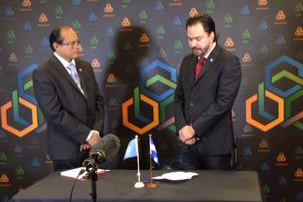
Secretario de los Convenios de Rotterdam,
Basilea y Estocolmo Rolph Payet y Embajador
Giampaolo Rizzo-Alvarado
Dirección General de Comunicación Estratégica Tegucigalpa, M.D.C. martes 19 de mayo de 2015
|
 |
Finishing at 03:45 in the morning of Saturday, 16 May 2015, the Meetings of the Conferences of Parties to the Basel, Rotterdam and Stockholm Conventions are over, with several key decisions taken.
Parties adopt key decisions at 2015 Triple COPs
 Geneva, Switzerland - 16 May, 2015
Significant steps were agreed upon by parties to the Basel, Rotterdam, and Stockholm Conventions, as the 2015 Triple COPs drew to a close early morning on 16 May 2015.
Staged under the theme “From Science to Action: Working for a Safer Tomorrow” from 4 to 15 May 2015, almost 1,200 participants from 171 countries converged on Geneva to push forward the chemicals and waste agenda at this biennial event.
A number of technical guidelines for the management of waste under the Basel Convention, four new listings (three under the Stockholm and one under the Rotterdam Conventions - polychlorinated napthalenes, hexachlorobutadiene, and pentachlorophenol and its salts and esters; and methamidophos respectively), and continued and strengthened synergies and implementation arrangements were the highlights of the decisions adopted on the final day. Meanwhile several chemicals considered were not listed, but instead deferred or made subject to special inter-sessional working group focus.
Basel Convention technical guidelines, aimed at assisting Parties to better manage crucial waste streams and move towards environmentally sound management (ESM), were adopted covering mercury waste and persistent organic pollutants (POPs) waste (one general and 6 specific waste-streams). Of high significance is the adoption on an interim basis of the technical guidelines concerning the transboundary movement of e-waste and used electronic and electrical products.
The BC technical guidelines on electronic, or e-waste provide much-needed guidance on how to identify e-waste and used equipment moving between countries, with the aim of controlling illegal traffic. Adoption came just days after UNEP released new data suggesting that as much as 90% of e-waste is dumped illegally, costing countries as much as US 18.8 $ billion annually and posing severe hazards to human health and the environment, particularly in Africa. Designed to provide a level playing field for all parties to the Convention, the guidelines will support and also encourage genuine recovery, repair, recycling and re-use of non-hazardous electronic components and equipment.
Regarding those pesticides where consensus could not be reached for listing, including paraquat and fenthion formulations, and trichlorfon, Clayton Campanhola, FAO Executive Secretary of the Rotterdam Convention, commented that “hazardous pesticides are not helping countries to produce more food with less, on the contrary: if badly managed, they cause negative impacts on natural resources and the health of rural communities and consumers.” In this respect, Parties requested additional technical assistance and support to identify alternatives to the use of hazardous pesticides which – if combined with integrated pest management (IPM) and agro-ecological approaches – form the basis for sustainable agricultural and rural development.
Whilst many Parties expressed their disappointment at the inability to reach consensus required for listing more of the chemicals proposed to be listed under the Rotterdam and Stockholm Conventions, the BRS Executive Secretary Rolph Payet stressed the significance of the steps taken in noting that “our Conventions’ joint and mutually reinforcing objective is the protection of human health and the environment, and the Guidelines and additional listings decided upon by Parties during these two weeks continue to move us in this crucial direction. We have to place the sustainable management of chemicals and waste in the context of peoples’ lives, especially the more than 1 billion people on our planet who continue to live in absolute poverty and who strive to better themselves in whatever ways they can. We will never waver in our moral and political responsibilities towards the most vulnerable people in this world, and I believe strongly that the three conventions continue to offer the best framework for moving jointly towards a greener, more inclusive economy, and a safer tomorrow for all”.
Notes for editors:
-
The Basel Convention on the Control of Transboundary Movements of Hazardous Wastes and their Disposal is the most comprehensive international environmental agreement on hazardous and other wastes and has 183 parties.
-
The Rotterdam Convention on the Prior Informed Consent Procedure for Certain Hazardous Chemicals and Pesticides in International Trade promotes shared responsibility and cooperative efforts among its 154 Parties.
-
The Stockholm Convention on Persistent Organic Pollutants (POPs) is a global treaty to protect human health and the environment from chemicals that remain intact in the environment for long periods, become widely distributed geographically, accumulate in the fatty tissue of humans and wildlife, and have harmful impacts on human health or on the environment. It has 179 Parties.
-
Polychlorinated napthalenes, Hexachlorobutadiene, and Pentachlorophenol and its salts and esters, are persistent organic pollutants (POPs) posing serious threats to human health and the environment.
-
Methamidophos is an extremely toxic organophosphate insecticide, causing serious adverse effects to human health, particularly to neural, immunity and reproductive systems.
-
E-waste data from the UNEP report “Waste Crime – Waste Risks: Gaps in Meeting the Global Waste Challenge” UNEP and GRID-Arendhal/Nairobi (2015), 67pp, ISBN: 978-82-7701-148-6
For more information, please refer to:
Website: www.brsmeas.org
BRS Secretariat
Kei Ohno Woodall, Programme Officer,
kei.ohno-woodall@brsmeas.org tel: +41-79-2333218
BRS Press
Charlie Avis, Public Information Officer
Charles.avis@brsmeas.org tel: +41-79-7304495
FAO
Christine Fuell, Senior Technical Officer, Rotterdam Secretariat, Rome:
Christine.fuell@fao.org tel: +39-06-57053765
FAO Press
George Kourous, Information Officer, FAO Rome:
George.kourous@fao.org tel: +39-06-57053168
|
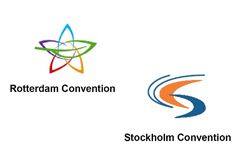 |
Continuing the implementation of scientific synergies among global chemical agreements, the Rotterdam Convention’s Chemical Review Committee held its tenth meeting at the Food and Agriculture Organization (FAO) Headquarters in Rome, 22-24th October 2014, back-to-back with the tenth meeting of the Stockholm Convention’s POPs Review Committee, 27-30th October 2014.
Global chemical conventions work together to continue supporting productive and sustainable agriculture, while protecting human health and the environment
 Continuing the implementation of scientific synergies among global chemical agreements, the Rotterdam Convention’s Chemical Review Committee held its tenth meeting at the Food and Agriculture Organization (FAO) Headquarters in Rome, 22-24th October 2014, back-to-back with the tenth meeting of the Stockholm Convention’s POPs Review Committee, 27-30th October 2014.
The Chemical Review Committee (CRC), a subsidiary body of the Rotterdam Convention, made up of technical experts from across the world, met from 22-24th October and reviewed notifications of final regulatory action on three industrial chemicals and adopted draft decision guidance documents for the pesticide Methamidophos; and for the severely hazardous pesticide formulation .
Methamidophos is an insecticide widely used on a variety of crops including wheat, fruit trees, tomatoes, cotton, soybean and potatoes. Both chemical and non-chemical (Integrated Pest Management) alternatives are readily available. Fenthion[1] is used as a spray for bird control and can be replaced by a number of non-chemical measures including protection with nets, nest removal, bird scaring and trapping.
The recommended decision guidance documents will go forward for consideration of inclusion of these chemicals under the Rotterdam Convention at the forthcoming meeting of the Conference of the Parties (COP) to be held in Geneva in May 2015. “In doing so, we contribute not only to an informed decision making but also to the protection of the health of farmers and their families and with this we have a positive impact on food security at large”, said Christine Fuell, the Coordinator of the Rotterdam Convention Secretariat within the FAO. If approved at the COP, the Convention’s Prior Informed Consent Procedure will then apply also to these pesticides.
Following from that, the Persistent Organic Pollutants Review Committee (POPRC), a subsidiary body of the Stockholm Convention on Persistent Organic Pollutants (POPs), met from 27-30th October and recommended the listing of pentachlorophenol and its salts and esters (PCP, sometimes commonly known as “angel dust”) within the list of POPs. The Committee thus recommended the elimination of its future production and use, while providing for a time-limited specific exemption for its production and use for utility poles and cross-arms. In doing so, the Committee adopted the risk management evaluation and proposed a recommendation for labelling requirements warning against the re-use for non-specified purposes. Whilst in the past this chemical was used as a biocide, insecticide, disinfectant and anti-microbial agent, these uses have been increasingly phased out although it is still used for preservation of, for example, wooden railway cross ties (or “sleepers”).
The Committee further considered a proposal for listing dicofol a pesticide and acaricide used in many countries on a variety of fruit, vegetable, and ornamental crops. Chemically related to DDT, a substance already listed in Annex B of the Convention, dicofol will now be scrutinized by the Committee for its potential persistent organic pollutants properties as the next step of the review process.
The work of the Committee members was described as very inclusive, very precise, and of high quality. Members also provided ideas and input for the preparation of the Science Fair that will be held during the upcoming meetings of the COPs in 2015. Reflecting the overall theme of the COPs “From Science to Action, Working Today for a Better Tomorrow” the Science Fair will highlight the work of Committees such as CRC and POPRC in providing a solid scientific base for decision-making and policies related to sound chemicals management, a key cornerstone in governments efforts to transition towards a greener, more inclusive economic path.
For more information on these and other outcomes of the two committee meetings, please contact:
Contact:
Christine FUELL, Secretariat of the Rotterdam Convention (FAO), Rome: + 39-06-5705-3765 + 39-06-5705-3765, christine.fuell@fao.org. + 39-06-5705-3765, christine.fuell@fao.org.
Kei OHNO WOODALL, Secretariat of the Basel, Rotterdam and Stockholm Conventions (UNEP), Geneva: +41-22-917-78201, kei.ohno-woodall@brsmeas.org .
Charlie AVIS, Secretariat of the Basel, Rotterdam and Stockholm Conventions (UNEP), Geneva: +41-79-730-4495 +41-79-730-4495, charles.avis@brsmeas.org . +41-79-730-4495, charles.avis@brsmeas.org .
For more information: www.pops.int (Stockholm Convention) or www.pic.int (Rotterdam Convention).
|
 |
US$ 4.43 billion pledged for the Global Environment Facility.
Record Funding for the Global Environment
 GENEVA, April 16, 2014— 30 donor countries today pledged US$ 4.43 billion for the Global Environment Facility (GEF) to support developing countries' efforts over the next four years to prevent degradation of the global environment.
"Today's decision is a powerful signal from the global community about the importance of urgently reversing the negative environmental trends in order to ensure a sustainable future for everybody", said Naoko Ishii, CEO and Chairperson of the GEF. "I am extremely encouraged by the broad coalition that has come together behind the belief in GEF's ability to play a critical role in helping achieve this transformation."
The funding will support projects in more than 140 countries to tackle a broad range of threats to the global environment, including climate change, deforestation, land degradation, extinction of species, toxic chemicals and waste, and threats to oceans and freshwater resources. The GEF is the main global mechanism to support developing countries' to take action to fulfill their commitments under the world's major multilateral environmental agreements. In GEF-6, donors agreed to new financing in support of the Minamata convention on Mercury that was signed in 2013, bringing to five the total number global environmental conventions that the GEF serves.
"The Global Environment Facility has gained the confidence of development partners for its strong track record in protecting the global environment and for its sound management of development partner funds," said Joachim von Amsberg, Vice President for Concessional Finance and Global Partnerships in the World Bank Group, which serves as Trustee for the GEF. "The environmental challenges the global community faces are significant, and funding for the GEF-6 program will help put us on a path toward our shared goal of sustainable development."
Donors emphasized GEF's role in supporting innovative and integrated solutions for the global environment. Among a number of innovations contained in GEF-6 is a new Integrated Approaches Pilot aimed at addressing environmental challenges by focusing on some of the underlying drivers of environmental degradation through special focus on for example food security in Africa, sustainable city development and on taking deforestation out of global commodity supply chains—all issues that can only be effectively addressed if broad coalitions of stakeholders across countries and sectors can be brought together around a common action agenda.
“We welcome the more than US$ 4.3 billion pledged by 30 donor countries to address the urgent environmental needs of developing countries, and appreciate the increase in the overall amount of funding accorded to the chemicals and waste focal area announced today,” said Kerstin Stendahl, Executive Secretary ad interim of the Basel, Rotterdam and Stockholm Conventions.
“As the principal entity entrusted with the operation of the Financial Mechanism of the Stockholm Convention on Persistent Organic Pollutants (POPs), the GEF plays a catalytic role in leveraging funding from private and public donors for the Convention. We remain confident that the GEF will in the future be able to continue to address the growing financial and technical assistance needs of Parties to the Stockholm Convention, taking into account the increasing number of chemicals listed under the Convention and the growing number of parties it serves.”
“Every dollar pledged to address POPs chemicals must now be put to work as hard as possible to defeat the scourge of persistent organic pollutants,” Ms Stendahl added.
Mexico's Secretary of Finance and Public Credit, Luis Videgaray, who will host an Assembly of the GEF's 183 members in Cancun, Mexico, in May said, "Only by integrating environmental considerations into decision making by governments, private businesses and households can we hope to make a difference in the global environment. The GEF-6 effort gets under way at a critical time, and is a vital platform to help mobilize all stakeholders to play their part."
The GEF-6 program envisions devoting an increased share of resources to lower-income recipient countries. GEF will also further its engagement with the private sector, its work in gender mainstreaming, collaboration with civil society organizations, and increased focus on results and on leveraging other sources of funding for the benefit of the global environment by seeking higher levels of co-financing of its projects.
Underpinning efforts, the GEF is developing a longer-term strategy, GEF2020, which aims to enhance the GEF's impact by focusing its interventions more on the underlying drivers of environmental degradation.
Doris Leuthard, head of the Swiss Federal Department of the Environment, Transport, Energy and Communications that hosted the meeting in Geneva said "We have better scientific evidence that human activity can lead to tipping points with a risk of irreversible and abrupt environmental change. By focusing on the drivers of environmental change and by seeking multiple benefits, the GEF is taking the right approach to turn around the worrying trends in the global environment".
This Press Release is available in Spanish.
About the Global Environment Facility
The Global Environment Facility (GEF) unites 183 countries in partnership with international organizations, civil society organizations (CSOs), and the private sector to address global environmental issues while supporting national sustainable development initiatives. The GEF provides funding for projects related to biodiversity, climate change, international waters, land degradation, the ozone layer, and persistent organic pollutants.
Since 1991, the GEF has achieved a strong track record providing $12.5 billion in grants and leveraging $58 billion in co-financing for over 3,690 projects in over 165 countries. Through its Small Grants Programme (SGP), the GEF has also made more than 16,000 small grants directly to civil society and community based organizations, totaling $653 million.
Contact: Christian Hofer, Senior Communications Officer, GEF,
chofer@thegef.org.
|